
10 minute read
UPPER SCHOOL
BEGINNING AGAIN
THE UPPER SCHOOL IS ONCE AGAIN FULL OF STUDENTS.
By Brandon Neblett
HEAD OF UPPER SCHOOL
The first day of school was a day of both relief and anticipation throughout the Upper School. After more than a year and a half of attending school in either a partially or entirely virtual manner, all of us in the Upper School community would return to “doing school” the way we knew and loved it—in person, on campus, five days a week. We had avoided any COVID-19-related surge requiring us to alter our plans for a return to school, and we were excited to see friends, colleagues, teachers, advisors, and mentors again after the interruptions of the previous 18 months. We were back!
Many seniors contributed to orientations for new Upper School students at the end of the previous week. Their overt enthusiasm and well-earned confidence in our return to school helped establish precisely the right tone for the following week. Their leadership continued throughout the next six days, and their example helped us shift seamlessly into a rhythm of classes, advisories, and community activities. If you had been with us, you would never have guessed that we had been apart as a community for a year and a half, that we were adjusting to a new schedule, or that six members of the Upper School administration and faculty were in their first days of school at GCS. In short, Upper School students and faculty made it look easy. Another significant transition, another big success.
Several days later, we welcomed Upper School parents and guardians into the building for two familiar start-of-the-year activities that also returned with a flourish. Early in the evening, Damian Garcia and Jenn Auchmoody, co-directors of college counseling, led senior parents through Grade 12 College Night capturing the key “need-to-knows” about the next two months in the college admissions process. Immediately following that, Matt Walsh, head of school, and I gathered with parents and guardians from all Upper School grades in the gym to open Back to School Night. Following a miniature version of their student’s schedule, parents and guardians attended advisory, visited classrooms, met teachers, and reconnected with the Upper School building. I loved catching up with several parents and guardians I knew and meeting parents and guardians of new students. Still, the best part of the evening for me was simply being present—absorbing the opportunity to be “in the mix” again with the adults whose ongoing commitment to GCS makes everything we do possible.
On September 17, the entire Upper School went off campus for our annual Expedition Day, a long-standing tradition that accentuates the importance of experiential education at GCS. Freshmen spent the day on a field trip in downtown Baltimore exploring exhibits at the Walters Art Museum and the Reginald F. Lewis Museum of Maryland AfricanAmerican History and Culture and enjoying lunch around Harborplace. Sophomores were just a few miles away, paddling canoes and cleaning litter from the Patapsco River and its surroundings in the famous “canoe ’n scoop.” Juniors spent the day at the McKeldin area of Patapsco Valley State Park, completing a scavenger hunt through the woods. At the same time, seniors tackled a ropes course and team-building activities at the Claggett Center near Frederick. I was fortunate to return with ninth-graders ahead of schedule, so I was treated to the smiles and energy of each successive group of students and teachers as they strode into the building, sharing stories and laughing about their adventures. Even the juniors, caught in an unexpected downpour at Patapsco Valley State Park, were in high spirits.
As I look ahead, I know that we must continue to accept the uncertainty that this pandemic has forced upon us, especially with the rise of new variants. Doing so may mean unanticipated shifts for us in the 2021–2022 school year. Yet, every step in the beginning weeks of the new school year demonstrates the strength of our community, the potency of relationships in it, and the excitement created for our students. Whatever uncertainty we face, these will see us through. Dragons will prevail!
TINKER TAILOR MOTOR BIKE
ONE STUDENT’S INGENUITY LEADS TO CREATION OF A NEW EXTRACURRICULAR CLUB.
By Danielle Peterson
DIRECTOR OF MARKETING AND COMMUNICATIONS

As a Glenelg Country School lifer—a student who has attended GCS since at least Kindergarten—Josef Marschall ’22 is well connected. So, when he came up with the idea to create an automotive club, he knew which teachers to ask: Marc Schmidt, technology coordinator, and Ben Shovlin, Innovation Lab technical director.
“Josef came to us at the end of last [school] year and asked if he could start an automotive club,” explains Schmidt. “He has always been interested in this topic and has made a variety of projects over the years at his house.”
The combination of the COVID-19 pandemic and winter break provided the perfect opportunity for Marschall to improve his engineering skills. He started by building a workshop in the basement of his home and began working on different projects. While many students his age play video games or create TikTok videos, Marschall finds joy in other activities. “I’m interested in mechanical engineering, and I just like building things in my free time for fun,” he admits, which is why he decided to build a motorized bicycle in his spare time.
Using an old mountain bike stored in his basement, Marschall co-opted a weed wacker engine. This proved ineffective because the engine didn’t have enough torque. There was also no clutch, a mechanical device that engages and disengages the power transmission from the driving shaft to the driven shaft. “It didn’t work out properly,” Marschall concedes.
Undeterred, Marschall pressed forward. He purchased a $100 mid-rise bicycle kit from Amazon, and with a bit of determination, his vision of a motorized bicycle came to life this summer. With skills honed from previous projects, Marschall built his motorized bike in about a week. “I was kind of already experienced through previous trials and errors,” he explains.
In October, Marschall showed off his achievement to Upper School students in the automotive club he founded and Middle School students for social studies teacher Jason Born’s club activity. He demonstrated the bike’s mechanics and rode around campus. “I explained how to get up to speed and release the clutch at the right time.” The demonstration brought Marschall full circle, as several of his STEAM Fair projects won awards when he was in middle school, including one in which he built a hovercraft. Using a piece of plywood with a tarp underneath the project explained how air pressure allowed the board to hover. With a smile, he admits, “it was kind of cool.” He hopes his demo inspires today’s students. “Having middle school students come up to me asking, ‘Are you the one that built the hovercraft?’ shows that they’re pretty interested in learning more.”
In the meantime, Marschall is already building his next electrical bike. His goal is to create an electric vehicle based on different components that make Tesla successful for his integrative project. He is researching the company’s
use of artificial intelligence, battery technology, and design to build a new bicycle using CAD software.
As he prepares for commencement in the spring, Marschall is looking forward to a bright future. He plans to apply to the Coast Guard Academy to study mechanical engineering. “It’s a great STEM school. So, I’ll be able to [study engineering] and pursue that as a career.” As for starting his own electric bike company, Marschall laughs. “Maybe one day. You never know.”
A close-up view of the customized electric bicycle. Josef Marschall ’22 demonstrates using his custom-built electric bike to students.
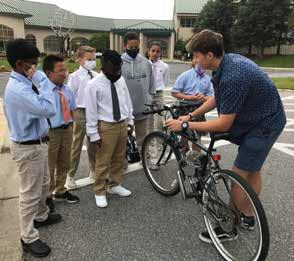










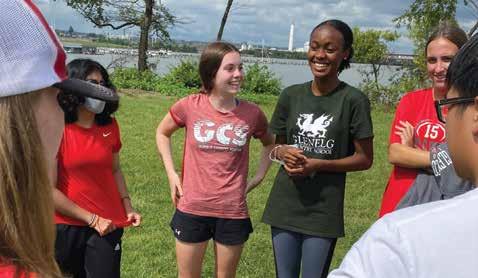





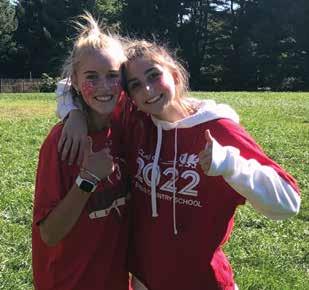
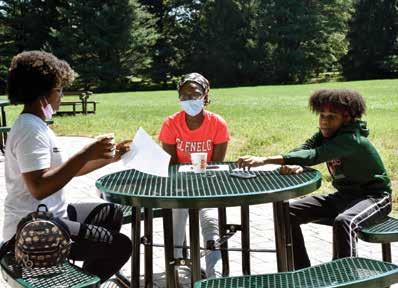
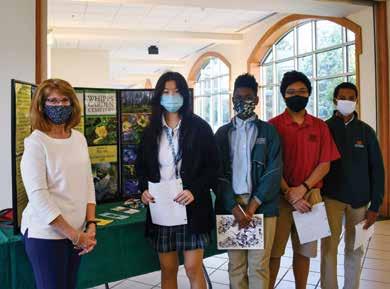
FACULTY SPOTLIGHT LaRon Land
LaRon Land’s jazz talents continue a family tradition of educating students.
PLEASE GIVE US SOME BACKGROUND ON YOURSELF AND YOUR EXPERIENCE.
I am a saxophonist and educator from Houston, TX, inspired by the illustrious Texas tenor saxophone tradition of skillful players such as Illinois Jacquet, Arnett Cobb, and Wilton Felder. Early involvement in school jazz ensembles and summer programs eventually led me to study with the legendary saxophonist and educator Conrad Johnson. Studying with Johnson deepened my interest in jazz and led me to pursue music as a career. Attending Kinder High School for the Performing and Visual Arts, Houston’s world-renowned magnet high school, placed me in the best environment to further my craft as a young musician. I attended Howard University, where I received my bachelor’s degree in music education with a minor in jazz studies. Later, I also acquired a master’s degree in jazz performance from Queens College under the tutelages of professors Michael Mossman and Antonio Hart. For the last 10 years, I have worked as a saxophonist for blues band Bobby Kyle and The Administers. I am also a music producer for advertising and mainstream airplay.
WHY TEACHING?
I honestly feel like the profession of being an educator was somehow part of my DNA. My mother, my aunts (who raised my mother), and my great-grandfather were all educators. There aren’t many feelings of joy that are comparable to seeing students engage, learn, progress, and have fun. In high school, my mother suggested that I get a degree in music education which, then in my brash shortsightedness, I thought I would never actually do. I’m happy to say I took my mother’s sage advice, and I would not change it for the world.
WHAT BROUGHT YOU TO GCS?
My family and I were planning to move to the area, and I was interested in seeking a music position within a private high school. I taught music within the public sector for 14 years and was looking for a change. I found GCS and was contacted by Eline Reis. I visited the campus, and I fell in love with the community.
WHAT IS ONE OF THE MOST REWARDING MOMENTS AS A TEACHER?
This is a tricky question to answer because there are so many moments. But, seeing students continue with music after they graduate is probably one of the most rewarding things for me.
HOW HAS THE PANDEMIC CHANGED YOUR APPROACH TO TEACHING? ANY ADVANTAGES?
The pandemic has dramatically affected how I and others have managed and altered the previously used methods in the classroom. The word “ensemble” is of French origin meaning “all the parts of a thing considered together.” Unfortunately, online bands cannot technologically play together simultaneously at this moment. When we weren’t in person, teaching sheet music parts and understanding ensemble dynamics took a lot longer and required everyone to exercise patience. However, we learned and presented a collaborative piece using a digital audio workstation. This was a first for our ensemble, and it came off beautifully!
WHAT ADVICE DO YOU HAVE FOR STUDENTS LEARNING IN A PANDEMIC?
I mentioned that patience is essential in a situation such as this. Learning in a pandemic takes more time, more independent practice, and more autonomy upon each student. It requires students to prepare and organize themselves better to engage and interact within the constraints of this pandemic. I encourage students to “stay the course!” While this can be a frustrating experience for all, it is important to remember that having a positive mental attitude and presenting your best work still goes a long way.






